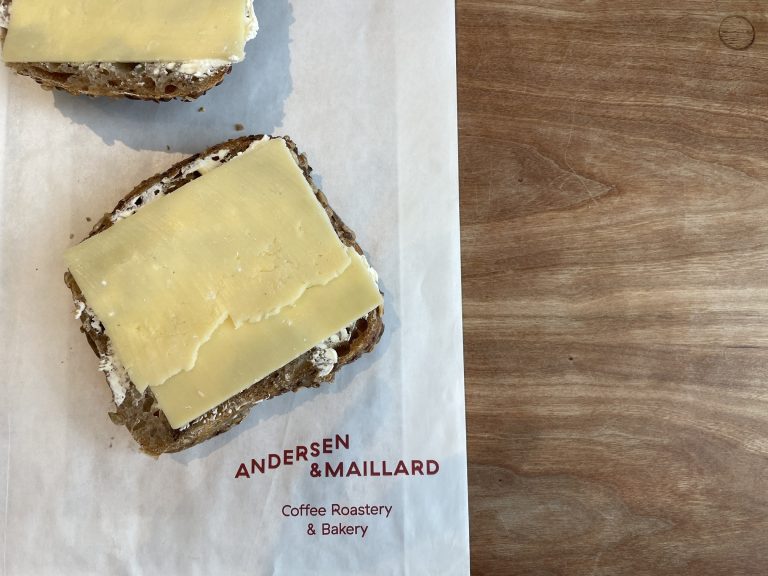Around 20 people are lined up outside Apotek57 bakery on Fredericiagade Street, most of them eager to order BMO (bolle med ost).
The situation is similar at Atelier September, around the next street corner, where neatly arranged mountains of whipped butter sit behind a glass counter. “We get a lot of customers who come in specifically because they care about the appearance,” says Atelier September's Gerald.
The rest come for the buttered bread. The BMO is one of the most popular dishes, a staple for regulars and tourists alike. “It's become a specialty dish in the Copenhagen area,” says Gerard.
It is an abbreviation of “Bolle med Ost” which means bread roll with cheese, but technically it is just a simple bread with butter and cheese in between. It is a traditional staple food in Denmark, but is becoming an increasingly popular breakfast dish.
That may sound simple, but all three ingredients need to be perfectly handpicked to be convincing.
Atelier September uses 24-month aged Comté cheese and bread from a local bakery (technically, it's not a BMO without a bun, but many other bakeries offer sliced bread instead of a roll).
The best part is the whipped butter: “Its creamy texture and rich flavour really complement the other ingredients,” says Gerard.
Atelier September whipped butter. Photo: Clara Meyer
This earned Atelier September's cheese bread a score of 5.4 out of 6. At least, that's what the Instagram page @bolle.med.ost claims. Every week, the anonymous couple who run the account rate a BMO. They have more than 10,000 followers and have already reviewed 110 different BMOs.
The duo share photos and writings on Instagram, and have a detailed table on their website that rates every aspect of BMO. The currently highest scoring cheese bread comes from Juno the Bakery, with a BMO score of 5.8.
Jeunot uses the same cheeses as Atelier September – Comté is a particularly popular choice, along with Gammel Kunath and Vesterhafsost – but it's the whole package that counts.
The Instagram reviewers, both full-time mathematicians, took an average across five categories. “But bread is more important than butter,” says the husband. “It needs to be crunchy with a soft center, and it needs to have a bit of sourness.” Usually sourdough is used.
Sourdough bread was popularized in Denmark by Copenhagen chef, baker, and entrepreneur Claus Meyer, co-author of the 2004 New Nordic Cooking Manifesto, which advocated for Scandinavian cuisine's emphasis on local, seasonal ingredients.
In 2010, Meyer opened the first of 11 Meyer's Bagheri locations. However, in Bölle Med Ost's BMO ranking, Meyer's Bagheri has a relatively low score of just 3.4 points. The main drawback is the cheese selection. Meyer uses Danbo, which the Instagram page owner says tastes like plastic.
Nevertheless, Meyer had a major impact on Copenhagen's bakery scene. The success of his bakery was followed by many others, including the chains Hart Bakery (BMO score: 3.1), Lille Bakery (BMO score: 4.1) and Andersen & Maillard. The latter, founded by Noma chef Milton Abel, has an extremely high score of 5.4 and uses Arla's signature soft and salty Gammel Kunath.
BMO in Juno. Photo: Clara Meyer
The bakery founders show how fine and simple cuisine go hand in hand in Copenhagen. “The bakery scene is amazing right now,” say Instagram reviewers, with only a handful giving it very high ratings. In their reviews, they focus exclusively on the quality of the bakery. The aesthetics of the cafe are described in Instagram captions, and the prices are listed on the table.
While most BMOs charge between 30 and 40 kroner, Atelier September charges 95 kroner, and Gerard says the higher price reflects “the high-quality ingredients and craftsmanship that goes into every dish.”
Juno is fairly cheap at 35 kroner per BMO, though this is also down to the simplicity of the bakery and limited seating options on the outdoor terrace.
The relatively low prices overall are one of the reasons BMO is so trendy: while you might pay 200 kroner for a brunch at other breakfast cafes, BMO and coffee are cheap and you can also buy Kaldemos Nourell.
Another reason for BMO's success was the coronavirus lockdown, which forced cafes and restaurants to close but allowed bakeries to stay open. BMO benefited from the restrictions and remained popular long after restaurants reopened.
But assessors said there had been a particular upward trend over the past 12 months “following the craze for bakeries and Danish food in general”.
Gerard of Atelier September has also noticed a recent upturn and attributes it to “a growing reputation and a growing appreciation for simple, high-quality food.”
The Danish classic breakfast is so popular it's now being served all over the world: Atelier September just opened a pop-up cafe in Seoul, and Aarhus-based bakery La Cabra, which also has a store in Copenhagen, has opened locations in New York, Muscat and Bangkok.
Berlin's SOFI bakery is particularly good, according to an Instagram reviewer: “They're popping up all over the world, it's an interesting development.”
Insiders' use of the abbreviation BMO is also relatively new: Politiken first reported on its use in May. The dropping of syllables and the establishment of an entirely new term speaks to the growing popularity of the simple, traditional Danish breakfast.
Recommended Bakeries – BMO Guides of Copenhagen and the World:
Andersen & Maillard – 3 locations in Copenhagen: Nordbro, Nordhavn, Indre By Apotek 57 – Indre By Atelier September – 3 locations in Copenhagen: Indre By, Østerbro, Hellerup HART – 4 locations in Copenhagen: Frederiksberg, Holmen, Refsjaleoen, Vesterbroliir Bakery – Reffen Meyer's Bageri – 11 stores in Copenhagen: Norrebro, Østerbro (Klassensgade, Nordre Frihavnsgade), Amager, Frederiksberg (Gl. Kongevej, Godthåbsvej), Indre By (Store Kongensgade, Torvehallerne, Tivoli), Lynby, Christianshavn Juno the Bakery – Østerbro La Cabra – 3 locations in Aarhus, 1 in Copenhagen (Indre By), 2 in New York, 1 in Muscat, 3 in Bangkok SOFI Bakery – Berlin, Germany

